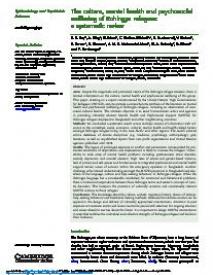The culture, mental health and psychosocial wellbeing of Rohingya refugees : a systematic review
Despite the magnitude and protracted nature of the Rohingya refugee situation, there is limited information on the culture, mental health and psychosocial wellbeing of this group. This paper, drawing on a report commissioned by the United Nations High Commissioner for Refugees (UNHCR), aims to provide a comprehensive synthesis of the literature on mental health and psychosocial wellbeing of Rohingya refugees, including an examination of associated cultural factors. The ultimate objective is to assist humanitarian actors and agencies in providing culturally relevant Mental Health and Psychosocial Support (MHPSS) for Rohingya refugees displaced to Bangladesh and other neighbouring countries.
We conducted a systematic search across multiple sources of information with reference to the contextual, social, economic, cultural, mental health and health-related factors amongst Rohingya refugees living in the Asia-Pacific and other regions. The search covered online databases of diverse disciplines (e.g. medicine, psychology, anthropology), grey literature, as well as unpublished reports from non-profit organisations and United Nations agencies published until 2018.
The legacy of prolonged exposure to conflict and persecution compounded by protracted conditions of deprivations and displacement is likely to increase the refugees' vulnerability to wide array of mental health problems including posttraumatic stress disorder, anxiety, depression and suicidal ideation. High rates of sexual and gender-based violence, lack of privacy and safe spaces and limited access to integrated psychosocial and mental health support remain issues of concern within the emergency operation in Bangladesh. Another challenge is the limited understanding amongst the MHPSS personnel in Bangladesh and elsewhere of the language, culture and help-seeking behaviour of Rohingya refugees. While the Rohingya language has a considerable vocabulary for emotional and behavioural problems, there is limited correspondence between these Rohingya terms and western concepts of mental disorders. This hampers the provision of culturally sensitive and contextually relevant MHPSS services to these refugees.
The knowledge about the culture, context, migration history, idioms of distress, help-seeking behaviour and traditional healing methods, obtained from diverse sources can be applied in the design and delivery of culturally appropriate interventions. Attention to past exposure to traumatic events and losses need to be paired with attention for ongoing stressors and issues related to worries about the future. It is important to design MHPSS interventions in ways that mobilise the individual and collective strengths of Rohingya refugees and build on their resilience.
Geachte bezoeker,
De informatie die u nu opvraagt, kan door psychotraumanet niet aan u worden getoond. Dit kan verschillende redenen hebben,
waarvan (bescherming van het) auteursrecht de meeste voorkomende is. Wanneer het mogelijk is om u door te verwijzen naar de bron
van deze informatie, dan ziet u hier onder een link naar die plek.
Als er geen link staat, kunt u contact opnemen met de bibliotheek,
die u verder op weg kan helpen.
Met vriendelijke groet,
Het psychotraumanet-team.
In: Epidemiology and Psychiatric Sciences, ISSN 2045-7960 ; eISSN 2045-7979 | 28 | 5 | 489-494
https://doi.org/10.1017/S2045796019000192


